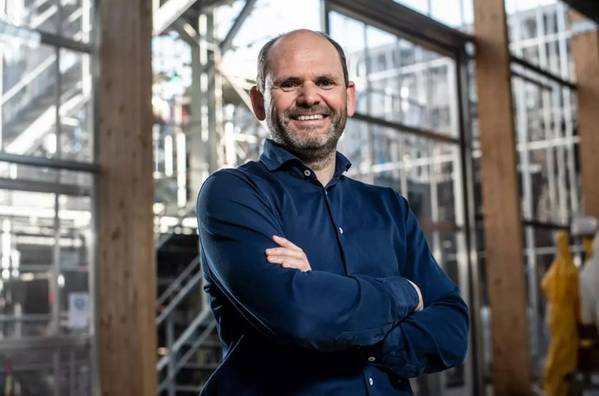
In the chemical industry, steam is indispensable for production processes. "But you always end up with residual heat, up to 100 degrees hot. Companies often can’t do anything with it, so they end up discharging it into the air or water," Wouter Ducheyne explains. With his company Qpinch, he has developed the technology to generate CO2-free energy from this residual heat.
Industrial heat recovery
Ducheyne is a civil chemical engineer and started his career at BASF, which, like all other chemical companies, is a major energy user. "As a society we focus so hard on electricity that you would forget that we use most of our industrial energy as heat.
"We developed a solution that is the next step in energy efficiency. We found the inspiration for this approach in nature: how do humans, and in fact all organisms, store energy and how do they release it?
"Together with UGent, we refined this process for industrial heat recovery. Unlike heat pumps, the patented Qpinch process uses hardly any energy. The result? Up to 30% savings in electricity costs, significantly shortening the technology’s ROI period," Ducheyne said.
Also for other sectors
Qpinch has now been in existence for 10 years. Its first industrial customer was the international chemical company Borealis. Among other sites in Flanders, Borealis has a plant in Zwijndrecht, in the port of Antwerp. "Our technology, in Europe’s largest chemical cluster, has the potential for CO2 savings of 200 megawatts a year. Does this make us THE solution for the green transition? No, but we are part of the overall picture, alongside solar and wind energy, both of which are not always available. Crucially, we are able to provide industry with constant power," Ducheyne said.
It’s no coincidence that Qpinch – which in recent years has grown to a scale-up with some 20 employees – is based in the port of Antwerp. "We were able to set up our pilot plant in a vacant warehouse in the heart of the port, near to our customers and easily accessible to employees.
"To make an impact with our facilities, we need to scale up, aiming for large volumes. Here in the port, we have just the right large companies. And they don’t have to be chemical companies; for example, we have now entered into partnerships with food companies," Ducheyne said.
Could Qpinch’s technology also be used for residential purposes? "Using heat to heat homes or offices is not optimal. For such heating, low temperatures are sufficient, and you only need energy for about a third of the day, so it would be wasted. Industry, on the other hand, runs 24 hours a day and often needs heat at high temperatures."
Multinationals playing a pioneering role in Flanders
In Ducheyne’s view, the entire region between Zeebrugge and Antwerp is one big economic zone. "Especially when you start looking at it from an international perspective. Thus, any upscaling can only be welcomed. I only see advantages in the Port of Antwerp-Bruges merger. The ecosystem is growing and with it the visibility of what we are doing. Indeed, it’s no coincidence that many multinationals are pioneering new technology here. We can also count on Flemish and European subsidies to make the investment for companies more affordable. And they can subsequently export this CO2-saving innovation to other countries within the group."
Partnership with Borealis
The international chemical company Borealis was Qpinch’s first commercial partner. "As a start-up, the company was able to attract massive interest after winning the 2015 Emerging Technology award in the British Royal Society of Chemistry’s annual competition. Borealis and Qpinch then teamed up with UGent’s Professor Christian Steven to commercially scale up the technology," said Erik Van Praet, Vice President Innovation & Technology at Borealis.
"Unlike conventional heat pumps, Qpinch’s closed-loop process minimizes our operating costs and power consumption. The technology is scalable from 1 to 50 megawatts (MW) and is thus able to process huge amounts of residual heat. The partnership with Qpinch was an important step forward in Borealis’ efforts to reduce its CO2 emissions and make its operations more energy-efficient and sustainable. We are currently saving some 2,200 tons of CO2 a year, equivalent to the emissions of 1,500 small family cars per year."
The heat recovery plant is located next to Borealis’ existing plant in Zwijndrecht. "That first commercial-scale installation was not only a milestone for Qpinch, but a beacon for the entire chemical sector," Ducheyne said. "Our partnership with a leading customer like Borealis will allow us to further upscale our technology, putting us on the road to expanding our business globally."



